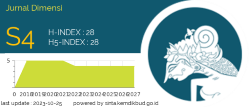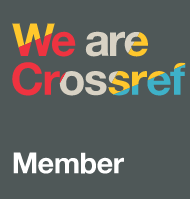THE USE OF ONLINE BRITISH COUNCIL APP TO IMPROVE INDONESIAN EYL STUDENTS’ VOCABULARY MASTERY
Abstract
Keywords
Full Text:
PDFReferences
Ahluwalia, S., Spicer, J., Patel, A., Cunningham, B., & Gill, D. (2020). Understanding the relationship between GP training and improved patient care–a qualitative study of GP educators. Education for Primary Care, 31(3), 145–152. Taylor & Francis.
Al-mashhadi, S., Anbar, M., Hasbullah, I., & Alamiedy, T. A. (2021). Hybrid rule-based botnet detection approach using machine learning for analysing DNS traffic. PeerJ Computer Science, 7, 1–34.
Ardina, M., Sinthia, R., & Suprapti, A. (2019). A Teacher’s Perception of Print and Digital Literacy in Early Childhood. Proceedings of the International Conference on Educational Sciences and Teacher Profession (ICETeP 2018) (Vol. 295, pp. 254–257). Paris, France: Atlantis Press.
Baguio, F., Rama, F. M. I., Rico, J. M. L., & Salazar, D. A. (2021). Grade 8 learner’s achievement and motivation level in geometry using kahoot! as a formative assessment. Journal of Physics: Conference Series, 1835(1).
Bahruddin, U., & Febriani, S. (2020). Implementation of Stephen Krashen’s Theory in Foreign Language Acquisition. International Journal of Innovation, Creativity and Change. www.ijicc.net, 13(8), 821–831. Retrieved from www.ijicc.net
Cheng, Y., & Milikich, N. (2023). An Analysis of How COVID-19 Shaped the Realm of Online Gaming and Lesson Delivery, 1–10. Retrieved from http://arxiv.org/abs/2304.06102
Dincer, A. (2020). Understanding the Characteristics of English Language Learners’ Out-of-Class Language Learning through Digital Practices Volume 8 – Issue 2 IAFOR Journal of Education: Technology in Education Volume 8 – Issue 2 IAFOR Journal of Education: Technology in. IAFOR Journal of Education: Technology in Education, 8(2), 47–65.
Elshahawy, K. E. M. (2020). Practicing English Through Digital Devices: Practices and Perceptions of the EFL Undergraduate Students Majoring in English Language. International Journal of Language and Literary Studies, 2(1), 21–37.
Guillén, G., Sawin, T., & Avineri, N. (2020). Zooming out of the crisis: Language and human collaboration. Foreign Language Annals, 53(2), 320–328.
Jabali, M., & Walker, C. (2021). An Exploratory Cross-Sectional Study: FlipQuiz as a Digital Tool for Learning English Vocabulary in Language Classroom. International Journal of Technology in Education, 4(3), 516–526.
Jiang, P., Namaziandost, E., Azizi, Z., & Razmi, M. H. (2023). Exploring the effects of online learning on EFL learners’ motivation, anxiety, and attitudes during the COVID-19 pandemic: a focus on Iran. Current Psychology, 42(3), 2310–2324. Springer US.
Khan, R. M. I., Alahmadi, A., Radzuan, N. R. M., & Shahbaz, M. (2024). A Qualitative Analysis of WhatsApp Integration on Speaking Vocabulary Development. Register Journal, 17(1), 146–163.
Klimova, B., Al-Obaydi, L. H., Tawafak, R. M., & Pikhart, M. (2023, June). The design features of digital games and their impact on language learning for EFL college students. Research Square.
Lasala, N. L. (2022). Validation of Game-Based Activities in Teaching Grade 7-Biology. Jurnal Pendidikan IPA Indonesia, 11(4), 519–530.
Nadeem, M., Oroszlanyova, M., & Farag, W. (2023). Effect of Digital Game-Based Learning on Student Engagement and Motivation. Computers, 12(9).
Octaberlina, L. R., & Rofiki, I. (2021). Using Online Game for Indonesian EFL Learners to Enrich Vocabulary. International Journal of Interactive Mobile Technologies, 15(1), 168–183.
Oxford, R. L., & Scarcella, R. C. (1994). Second language vocabulary learning among adults: State of the art in vocabulary instruction. System, 22(2), 231–243.
Pavita, M. D. A., & Nirmala, D. N. (2021). Merdeka Belajar in Pandemic: Using Quizizz Game Based Learning To Improve Students’ Vocabulary Mastery. Language Literacy: Journal of Linguistics, Literature, and Language Teaching, 5(1), 221–227.
Qalati, A. (2020). 3 2* 1, 8(3), 1–15.
Shabaneh, Y., & Farrah, M. (2019). the Effect of Games on Vocabulary Retention. Indonesian Journal of Learning and Instruction, 2(01).
Yu, B., & Liu, J. (2024). An Analysis of the Impact of Informal Digital Learning of Language on the Intercultural Communicative Competence of Chinese College Students (pp. 896–902). Atlantis Press International BV.
Yudha, H. T., & Mandasari, B. (2021). The Analysis of Game Usage for Senior High School Students to Improve Their Vocabulary Mastery. Journal of English Language Teaching and Learning, 2(2), 74–79.
Zamborova, K., & Klimova, B. (2023). The utilization of a reading app in business English classes in higher education. Contemporary Educational Technology, 15(3).
Zhang, P., & Graham, S. (2020). Learning Vocabulary Through Listening: The Role of Vocabulary Knowledge and Listening Proficiency. Language Learning, 70(4), 1017–1053.
DOI: https://doi.org/10.33373/dms.v14i2.7742
Refbacks
- There are currently no refbacks.

This work is licensed under a Creative Commons Attribution 4.0 International License.











